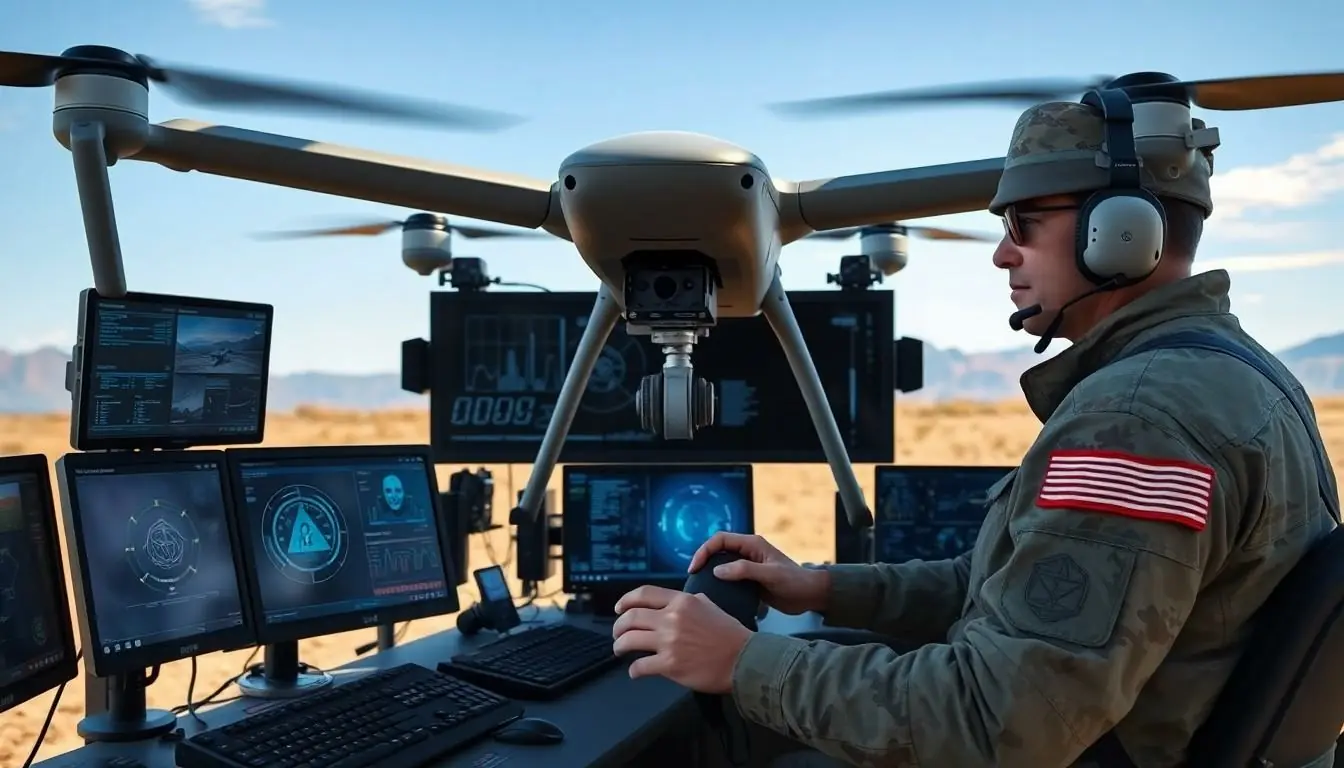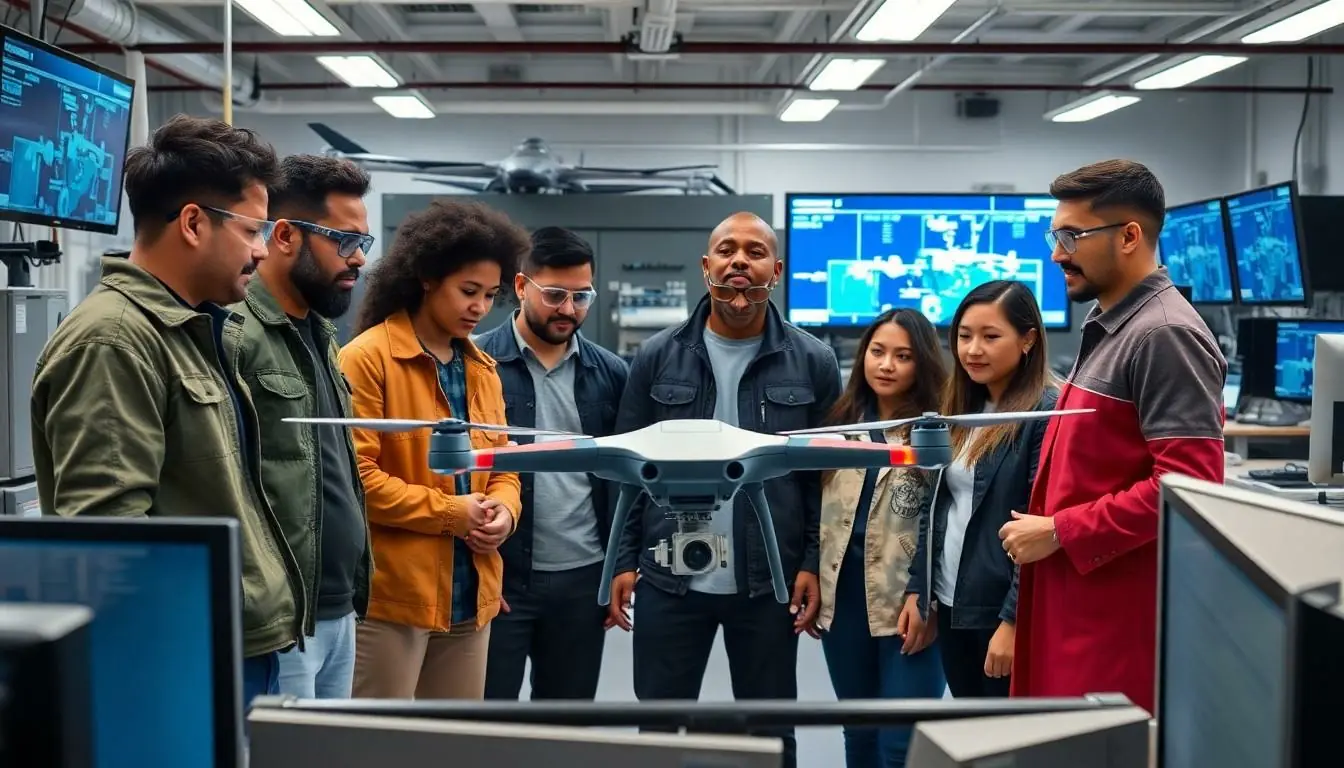In a world where technology evolves faster than a cat meme goes viral, defense tech startups are stepping up to the plate with innovations that could change the game. These nimble companies are combining cutting-edge technology with military know-how, creating solutions that are as vital as they are fascinating. Think of them as the Avengers of the tech world, minus the capes and with a lot more coding.
From drones that can outsmart your average squirrel to AI systems that predict threats before they even happen, these startups are pushing boundaries. They’re not just building gadgets; they’re redefining how we think about defense and security. As global challenges grow more complex, it’s these innovative minds that promise to keep us one step ahead—while making it all look pretty cool in the process.
Table of Contents
ToggleOverview of Defense Tech Startups
Defense tech startups emerge as critical players in modern security landscapes. These companies harness advanced technologies to tackle complex threats. Many startups focus on innovations like drones, artificial intelligence, and cybersecurity tools. National security significantly benefits from their agile approach to development and deployment.
Emerging trends highlight the growth of partnerships between startups and established defense contractors. Such collaborations amplify resources and enhance market reach. Startups often prioritize speed and adaptability, positioning themselves to respond quickly to shifting threats. Investment in defense technology by governments and private entities fuels this ecosystem’s expansion.
Key areas of focus include autonomous systems and data analytics. Autonomous systems improve operational efficiency on the battlefield, while data analytics enhance decision-making processes. Startups frequently address gaps in existing defense technologies, offering tailored solutions that meet specific operational needs.
As global challenges evolve, startups remain committed to innovation. They leverage cutting-edge research and development to stay ahead of adversaries. By doing so, these companies redefine traditional defense paradigms, ensuring that military forces operate effectively in an ever-changing environment. Their contributions are pivotal in shaping the future of national security and defense operations. This dynamic sector continues to attract attention due to its potential impact on global safety and stability.
Current Trends in Defense Technology

Defense technology is advancing rapidly, driven by innovative startups that address contemporary security needs. The landscape is changing due to trends in emerging technologies and funding.
Emerging Technologies
Artificial intelligence remains at the forefront of defense tech innovation. Startups develop AI algorithms that enhance threat detection and streamline decision-making processes. Drones and autonomous vehicles are gaining traction, allowing for safer reconnaissance missions. Advanced cybersecurity measures protect military data and infrastructure, mitigating risks from cyberattacks. Augmented reality is transforming training, making simulations more immersive and effective. These technologies collectively reshape defense strategies, ensuring that military operations adapt to evolving threats.
Funding and Investment Trends
Funding for defense tech startups is increasing steadily, with venture capital firms recognizing the potential of this sector. In 2022, investments in defense tech reached $8 billion, highlighting strong market interest. Partnerships with established defense contractors provide startups with necessary resources and expertise. Government contracts further fuel growth by providing guaranteed revenue streams. International collaboration is also on the rise, as countries seek innovative solutions to shared security challenges. Investors are keen to support technologies that promise to enhance operational efficiency and national security.
Key Players in the Defense Tech Startup Landscape
The defense tech startup sector features innovative companies dedicated to addressing contemporary security challenges. Their approaches vary, yet all aim to enhance military and national security capabilities.
Notable Startups to Watch
Shield AI specializes in artificial intelligence for autonomous systems, enhancing operational effectiveness. Anduril Industries develops real-time situational awareness technologies, helping military forces make informed decisions. Rebellion Defense focuses on software solutions to streamline defense operations, reducing risks in complex environments. AerialX targets drone technology for improved aerial reconnaissance, offering safer alternatives for intelligence gathering. Each startup brings unique solutions to the field, driving progress in defense technology.
Collaboration with Established Defense Contractors
Collaboration boosts the capabilities of defense tech startups. Partnerships with seasoned defense contractors provide essential resources, including funding and expertise. Innovators like Palantir Technologies leverage existing infrastructures to enhance their technological advancements. Northrop Grumman’s alliances with startups facilitate knowledge transfer and accelerate product development timelines. Such collaborations position startups to take advantage of established networks, maximizing their reach and impact within the defense sector.
Challenges Facing Defense Tech Startups
Defense tech startups encounter various challenges as they strive to innovate in the security landscape. Understanding these hurdles is crucial for navigating the complex terrain of defense technology.
Regulatory Hurdles
Navigating regulatory hurdles poses significant challenges for defense tech startups. Startups must adhere to strict government regulations that govern defense contracting and technology development. Security clearances often complicate hiring processes, limiting access to top talent. Compliance with export control laws also restricts the ability to share technology internationally. Meeting these requirements can consume valuable resources and time, impacting overall agility. Establishing relationships with regulatory bodies can help startups navigate these complexities more effectively.
Market Competition
Market competition presents another formidable challenge for defense tech startups. Established defense contractors wield extensive experience and resources, making it difficult for newer firms to enter the market. Competing against well-funded corporations creates pressure on startups to innovate rapidly. Differentiation becomes crucial for attracting government contracts and partnerships. Building strategic alliances can enhance their market position, allowing startups to leverage the strengths of established players. Ultimately, startups must continuously adapt to maintain relevance in a rapidly evolving industry.
Future Outlook for Defense Tech Startups
Defense tech startups are poised to significantly influence the security landscape. With advancements in artificial intelligence and autonomy, these companies will likely drive breakthroughs. Innovations in cybersecurity and data analytics remain crucial for enhancing threat detection and operational efficiency.
Partnerships with established defense contractors continue to expand. Collaborations enhance resources and streamline access to government contracts. Increased investments further demonstrate market confidence in this sector, with venture capital touching $8 billion in 2022.
Global challenges prompt nations to seek innovative solutions through international collaborations. Countries increasingly recognize the potential of defense tech startups to address shared security concerns. Their contributions not only improve military capabilities but also shape strategic defense initiatives.
Challenges persist, including stringent regulations and market competition. These hurdles require startups to cultivate differentiation and prioritize strategic alliances. Founders must navigate complex government frameworks while ensuring their technologies comply with established standards.
Startups that succeed will likely redefine operational paradigms. Companies like Shield AI, Anduril Industries, and Rebellion Defense exemplify innovation. Their initiatives reflect commitment to advancing military effectiveness while minimizing costs and risks.
Anticipated growth in the sector indicates a vibrant future. As technology evolves, more startups will emerge to address defense needs, ultimately enhancing national security. The ongoing dedication to innovation positions these companies at the forefront of an ever-changing global security environment.
Defense tech startups are transforming the security landscape with their innovative solutions and agile approaches. By harnessing advanced technologies like AI and drones, they’re addressing complex modern threats and enhancing military capabilities. Their collaborations with established defense contractors not only provide essential resources but also amplify their reach in a competitive market.
As funding continues to rise and partnerships expand, these startups are well-positioned to lead the charge in redefining national security strategies. Despite the challenges they face, their potential to influence future defense initiatives is significant. The ongoing evolution in this sector promises a new era of security solutions that will shape global defense paradigms for years to come.

